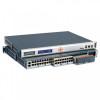Lantronix SLC 8000 Advanced Console Manager User Guide - Page 176
Text Mode, PPP Mode, Chap Local, Local Users
 |
View all Lantronix SLC 8000 Advanced Console Manager manuals
Add to My Manuals
Save this manual to your list of manuals |
Page 176 highlights
8: USB/SD Card Port Text Mode Timeout Logins Dial-in Host List If you selected Text mode, you can enable logins to time out after the connection is inactive for a specified number of minutes. The default is No. This setting is only applicable for text mode connections. PPP mode connections stay connected until either side drops the connection. Disabled by default. From the drop-down list, select the desired host list. The host list is a prioritized list of SSH, Telnet, and TCP hosts that are available for establishing outgoing modem connections or for connect direct at the CLI. The hosts in the list are cycled through until the SLC unit successfully connects to one. To establish and configure host lists, click the Host Lists link. Host Lists (on page 216) PPP Mode Negotiate IP Address If the SLC unit and/or the serial device have dynamic IP addresses (e.g., IP addresses assigned by a DHCP server), select Yes. Yes is the default. If the SLC unit or the modem have fixed IP addresses, select No, and enter the Local IP (IP address of the port) and Remote IP (IP address of the modem). Authentication Enables PAP or CHAP authentication for modem logins. PAP is the default. With PAP, users are authenticated by means of the Local Users and any of the remote authentication methods that are enabled. With CHAP, the CHAP Handshake fields authenticate the user. CHAP Handshake The Host/User Name (for UNIX systems) or Secret/User Password (for Windows systems) used for CHAP authentication. May have up to 128 characters. CHAP Auth Uses For CHAP authentication, determines what is used to validate the CHAP Host and Chap Local host/user sent by the remote peer: either the CHAP Host defined for the modem, or any of the users in the Local Users list. Same authentication for Dial-in & Dial-on-Demand (DOD) Select this option to let incoming connections (dial-in) use the same authentication settings as outgoing connections (dial-on-demand). If this option is not selected, then the dial-on-demand connections take their authentication settings from the DOD parameter settings. If DOD Authentication is PAP, then the DOD CHAP Handshake field is not used. DOD Authentication Enables PAP or CHAP authentication for dial-in & dial-on-demand. PAP is the default. With PAP, users are authenticated by means of the Local Users and any of the remote authentication methods that are enabled. With CHAP, the DOD CHAP Handshake fields authenticate the user. DOD CHAP Handshake For DOD Authentication, enter the Host/User Name for UNIX systems) or Secret/User Password (for Windows systems) used for CHAP authentication. May have up to 128 characters. Enable NAT Select to enable Network Address Translation (NAT) for dial-in and dial-out PPP connections on a per modem (device port or USB port) basis. Users dialing into the SLC access the network connected to Eth1 and/or Eth2. Note: IP forwarding must be enabled on the Network > Network Settings (1 of 2) page for NAT to work. See Chapter 6: Basic Parameters on page 71. Dial-out Number Phone number for dialing out to a remote system or serial device. May have up to 20 characters. Any format is acceptable. Remote/Dial-out Login User ID for authentication when dialing out to a remote system, or if a remote system requests authentication from the SLC device when it dials in. May have up to 32 characters. This ID is used for authenticating the SLC unit during the dial-out portion of a dial-back (including CBCP server) and dial-on-demand. SLC™ 8000 Advanced Console Manager User Guide 176















